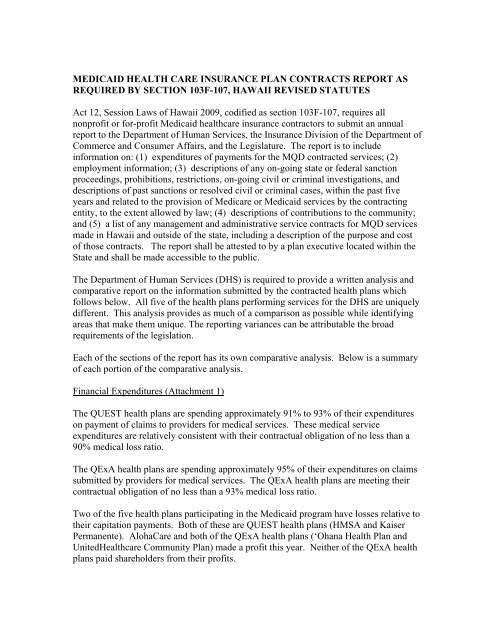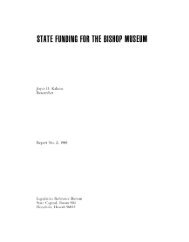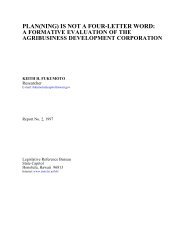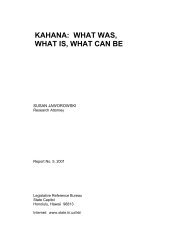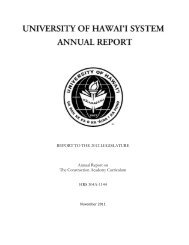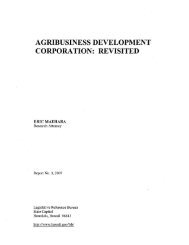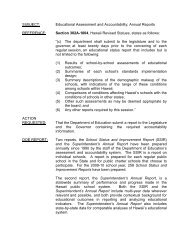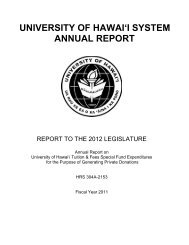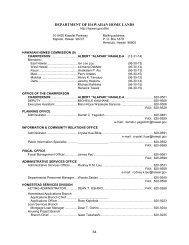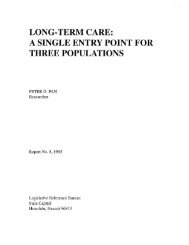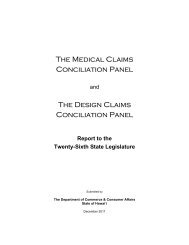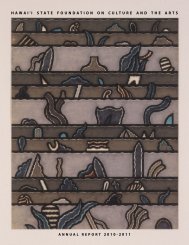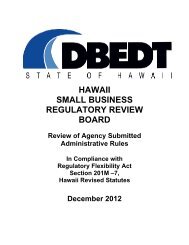2012 Section 103F-107 HRS Medicaid Contracts Report - Hawaii ...
2012 Section 103F-107 HRS Medicaid Contracts Report - Hawaii ...
2012 Section 103F-107 HRS Medicaid Contracts Report - Hawaii ...
Create successful ePaper yourself
Turn your PDF publications into a flip-book with our unique Google optimized e-Paper software.
MEDICAID HEALTH CARE INSURANCE PLAN CONTRACTS REPORT AS<br />
REQUIRED BY SECTION <strong>103F</strong>-<strong>107</strong>, HAWAII REVISED STATUTES<br />
Act 12, Session Laws of <strong>Hawaii</strong> 2009, codified as section <strong>103F</strong>-<strong>107</strong>, requires all<br />
nonprofit or for-profit <strong>Medicaid</strong> healthcare insurance contractors to submit an annual<br />
report to the Department of Human Services, the Insurance Division of the Department of<br />
Commerce and Consumer Affairs, and the Legislature. The report is to include<br />
information on: (1) expenditures of payments for the MQD contracted services; (2)<br />
employment information; (3) descriptions of any on-going state or federal sanction<br />
proceedings, prohibitions, restrictions, on-going civil or criminal investigations, and<br />
descriptions of past sanctions or resolved civil or criminal cases, within the past five<br />
years and related to the provision of Medicare or <strong>Medicaid</strong> services by the contracting<br />
entity, to the extent allowed by law; (4) descriptions of contributions to the community;<br />
and (5) a list of any management and administrative service contracts for MQD services<br />
made in <strong>Hawaii</strong> and outside of the state, including a description of the purpose and cost<br />
of those contracts. The report shall be attested to by a plan executive located within the<br />
State and shall be made accessible to the public.<br />
The Department of Human Services (DHS) is required to provide a written analysis and<br />
comparative report on the information submitted by the contracted health plans which<br />
follows below. All five of the health plans performing services for the DHS are uniquely<br />
different. This analysis provides as much of a comparison as possible while identifying<br />
areas that make them unique. The reporting variances can be attributable the broad<br />
requirements of the legislation.<br />
Each of the sections of the report has its own comparative analysis. Below is a summary<br />
of each portion of the comparative analysis.<br />
Financial Expenditures (Attachment 1)<br />
The QUEST health plans are spending approximately 91% to 93% of their expenditures<br />
on payment of claims to providers for medical services. These medical service<br />
expenditures are relatively consistent with their contractual obligation of no less than a<br />
90% medical loss ratio.<br />
The QExA health plans are spending approximately 95% of their expenditures on claims<br />
submitted by providers for medical services. The QExA health plans are meeting their<br />
contractual obligation of no less than a 93% medical loss ratio.<br />
Two of the five health plans participating in the <strong>Medicaid</strong> program have losses relative to<br />
their capitation payments. Both of these are QUEST health plans (HMSA and Kaiser<br />
Permanente). AlohaCare and both of the QExA health plans (‘Ohana Health Plan and<br />
UnitedHealthcare Community Plan) made a profit this year. Neither of the QExA health<br />
plans paid shareholders from their profits.


